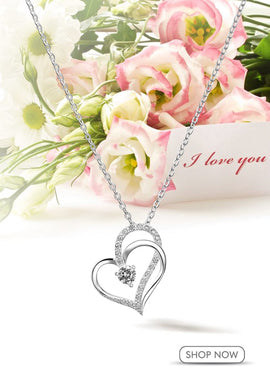When it comes to jewelry, necklaces are perhaps the most popular type of accessory fashion to wear. Necklaces have a way of highlighting your neckline without distracting your outfit of the day. From simple silver chain necklaces to extravagant statement necklaces, there’s no doubt that a necklace or two can easily elevate anything you wear.
Therefore, it is important to know the different functions and foundations of necklaces.
Today, we’ll be diving into the different parts of necklaces and learn more about them: -
The Chain
The chain is the primary foundation of a necklace, and they are often made of fabric cords, leather ropes or metal chains. These chain necklaces are often found in various lengths, and can range from lightweight dainty chains to rugged chunky chains.
Each necklace chain has its own unique qualities that will accentuate your neckline and fashion sense. Here are a few of the most common necklace chains you can come across: -
-
Cable Chains

The most common type of necklace chains used in jewelry making. Cable necklace chain is often lightweight and dainty in appearance, and pairs well with pendants.
-
Ball Chains

This type of chain necklace features dainty ball-shaped metal beads along the chain. This chain invokes an urban chic fashion statement. Ball chain necklaces can be worn standalone or paired with a dog tag necklace pendant.
-
Snake Chains

If you prefer a bolder statement necklace, the snake chain gives the illusion of the chain gliding glamorously along your neckline. This type of necklace chain is best worn standalone.
-
Paperclip Chains

A more modernistic take of cable chain necklaces, this chain features elongated delicate links interlocked with one another. Lightweight and easy to wear, this chain is perfect for those who like wearing minimalist jewelry.
When it comes to choosing chains for your necklaces, there are a lot of factors to consider. Learn how to choose silver necklace chains here.
The Clasp
Another important part of your necklace would be the fastener or the clasp. The clasp is usually located at the end of a necklace. Without the clasp, the necklaces won’t be fastened and secured in place. When it comes to necklaces clasps, there are a few options to choose from: -
-
The Hook-and-Eye Clasp

This necklace clasp is made of two parts: the Hook and the Circle. This is the simplest and easiest clasp to use, all you need to do is slip the hook into the circle to secure your necklace.
-
The Lobster Clasp
The most common and durable necklace clasp. This clasp is strong and easy to slip in the necklace chain. All you need to do is to pull the latch open and slip the chain through the opposite side.
-
The Spring Ring Clasp
This type of necklace clasp is lightweight and straightforward. To use this clasp, simply open one section of the ring to insert the opposite part of the necklace.
The Embellishments
Last but not least, what makes a necklace stand out and special from all the others is the embellishments. While necklaces can be worn on its own, adding an additional decoration helps to bring more emphasis to your outfit. The decorations are usually added and attached to the necklace chain as the finishing touch. There are 3 types of necklace embellishments, which are necklace charms, lockets, and necklace pendants.
1. Pendant
A pendant is a decorative embellishment that hangs from a necklace chain, and is available in a wide range of designs and jewelry metals. Necklace pendants are often larger than necklace charms and feature a stunning centerpiece to emphasize the neckline. Pendants are often secured with an attached bail and are secured to the chain necklace.
2. Charm

While necklace pendants generally hang directly on the chain, charms are often attached with a small ring (charm holder) for one or several charms. Necklace charms are smaller than pendants and hence have more decorative adornments.
3. Locket

Lockets are a type of necklace pendant, and they are often given to commemorate special moments in life like anniversaries or birthdays. These necklace ornaments feature a hinged cover that can be opened and closed. Lockets often feature a tiny compartment within the pendant that can store photos, sentimental tokens, or even customized engravings.
Overall, necklaces have various styles and options to choose from. Necklaces are versatile, stylish, and a fantastic finishing touch to any look. Now that you’ve read all about the different parts and functions of necklaces, we hope that this may help you understand how to choose which necklace style works best for you.
When buying a necklace, there are other factors you should know about like the length or how it will complement your figure. Learn how to choose the right necklace length with this guide here: -























